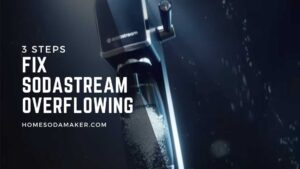Why is Carbonated Water Bad for Your Teeth? In recent years, carbonated water has emerged as a popular alternative to sugary sodas. However, you might have stumbled upon information suggesting that this fizzy drink might not be as tooth-friendly as we’d like. So, why is carbonated water bad for your teeth? This article will delve into the science behind these claims and offer expert insights into the topic.
The Truth About Carbonated Water and Dental Health

Carbonated water owes its bubbles to the process of carbonation, which results in the formation of a weak acid known as carbonic acid. This acid is what raises questions about the safety of carbonated water for dental health. Even though it’s a weak acid, it has the potential to erode tooth enamel over time, especially if consumed excessively.
This leads us back to our main question: why is carbonated water bad for your teeth? The answer lies in this potential for enamel erosion. Enamel is the hard, protective outer layer of our teeth, and it’s sensitive to acidic substances. Once enamel starts to erode, the underlying dentin becomes exposed, leading to increased tooth sensitivity and higher susceptibility to cavities.
Expert Insights on Carbonated Water and Dental Health

Several experts have weighed in on the topic of carbonated water and its effects on dental health. Here are some key takeaways:
- Carbonated water versus sugary drinks: Despite being slightly acidic, carbonated water is still a better option than sugary drinks or sodas, which contain both acids and high levels of sugar, a known contributor to tooth decay.
- The role of flavorings: Flavored carbonated waters may contain additional acids, such as citric acid, which can further increase the drink’s acidity and potential for causing tooth enamel erosion.
- Plain carbonated water: According to numerous health and dental experts, plain carbonated water is relatively harmless for dental health, especially when compared to its sugar-sweetened counterparts.
Tips for Drinking Carbonated Water Safely

Understanding why carbonated water can be bad for your teeth doesn’t mean you need to abandon your favorite fizzy drink altogether. Here are some tips to enjoy carbonated water without damaging your teeth:
- Moderate your consumption: Like any other acidic foods or beverages, carbonated water should be consumed in moderation.
- Opt for plain versions: If possible, choose plain carbonated water over flavored varieties, which often contain additional acids.
- Rinse your mouth: After drinking carbonated water, rinse your mouth with plain water to help neutralize the acid.
In conclusion, while there are reasons to be cautious about the effects of carbonated water on dental health, moderate and mindful consumption can help mitigate these risks. Always remember to maintain good oral hygiene practices, including regular brushing and flossing, to keep your teeth healthy and strong.
How Can I Protect My Teeth from Carbonated Drinks?

Carbonated drinks, while refreshing, can pose a risk to your dental health due to their acidity. Here are some strategies you can employ to protect your teeth:
- Limit your consumption: Moderation is key when it comes to carbonated drinks. Try to limit your intake and opt for healthier alternatives such as water or milk when possible.
- Use a straw: Using a straw can minimize the contact of the acidic beverage with your teeth, thereby reducing the potential damage.
- Don’t brush immediately after drinking: Brushing your teeth immediately after consuming an acidic drink can actually hasten enamel erosion. It’s advised to wait at least 30 minutes before brushing your teeth.
- Rinse your mouth with water: After consuming a carbonated drink, rinse your mouth with plain water. This helps to neutralize the acids and wash away any residue.
- Opt for less acidic drinks: Not all carbonated drinks are created equal. Some are more acidic than others. Opt for drinks that are lower in acid whenever possible.
- Maintain good oral hygiene: Regular brushing and flossing can help protect your teeth from the effects of carbonated drinks. Also, regular dental check-ups can help catch any potential issues early.
By following these tips, you can enjoy your favorite carbonated beverages while still maintaining a healthy smile.
Is sparkling water worse for your teeth than soda?
Based on a variety of sources, it’s evident that while sparkling water does have some potential to harm your teeth due to its acidity, it is generally considered to be less harmful than soda.
Soda not only contains acids but is also high in sugar, which contributes to tooth decay. On the other hand, sparkling water, especially unsweetened varieties, is less erosive and a healthier choice overall. However, it’s important to note that any type of carbonated beverage can contribute to the erosion of tooth enamel over time, so moderation is key.
A study examining the pH balances of over 400 beverages found that certain sparkling waters were ranked as only “minimally erosive,” making them a better choice for dental health compared to soda.
However, despite being a healthier alternative, it’s crucial to remember that regular, fluoridated water is the best beverage for both overall health and oral hygiene.
So, while sparkling water is not entirely risk-free when it comes to dental health, it’s still a better option than soda. As always, maintaining good oral hygiene practices, such as regular brushing and flossing, will also help protect your teeth regardless of what you choose to drink.
Do I need to brush my teeth again after drinking sparkling water?

Based on various sources, it’s recommended not to brush your teeth immediately after drinking sparkling water. The acidity in the sparkling water can soften the enamel on your teeth, making them more sensitive to abrasion. Brushing too soon after consuming the drink could potentially cause further damage to your softened enamel.
Instead, it’s suggested to wait at least 30 minutes after consuming the drink to brush your teeth. This gives your saliva a chance to neutralize the acids and harden your enamel again.
In the meantime, you can rinse your mouth with plain water to help remove any residue from the drink. This is an effective way to protect your teeth without causing unnecessary harm.
However, it’s crucial to remember that these precautions are only necessary when drinking flavored or sweetened sparkling waters with added acids and sugars. If you’re drinking plain carbonated water without any additives, it’s generally safe for your teeth and doesn’t require extra brushing.
Always remember, maintaining good oral hygiene practices, such as regular brushing and flossing, is essential for dental health regardless of your diet.
Is carbonated water hard on tooth enamel?

Based on several sources, carbonated water can potentially be hard on tooth enamel due to its acidity. The carbonation process results in the formation of carbonic acid, which can contribute to the erosion of tooth enamel over time.
However, the risk of damage is relatively minimal if the only ingredient is carbonated water and you maintain good oral hygiene practices. The risk increases if the carbonated water includes additional ingredients such as sugar, citric acid, or flavorings, which can contribute to enamel erosion.
Interestingly, while carbonated water does have a higher acidity level compared to regular water, unflavored sparkling water is unlikely to cause significant damage to your tooth enamel. Current research suggests that plain carbonated water poses little harm to your teeth.
Nonetheless, if you consume carbonated drinks, it’s recommended to wait at least 30 minutes before brushing your teeth. This helps prevent further damage as the acidity in the drink can soften your enamel, making it more susceptible to abrasion from brushing.
In conclusion, while carbonated water can potentially affect tooth enamel, the impact is significantly less than sugary beverages, whether still or carbonated. As always, maintaining good oral hygiene is crucial to minimizing any potential harm.
What are the disadvantages of sparkling water?
While sparkling water is a popular choice for those trying to reduce their consumption of sugary sodas, it does come with some potential disadvantages. Here are the main points to consider:
- Gas and Bloating: The carbonation in sparkling water can lead to gas and bloating in some individuals. If you notice excessive gas while drinking sparkling water, you may want to limit your intake.
- Potential for Tooth Decay: While sparkling water is far less harmful to teeth than sugary drinks, excessive consumption could potentially contribute to tooth decay due to its acidity. However, the risk is relatively minimal, especially if the beverage is consumed in moderation and good oral hygiene is maintained.
- Possible Trigger for IBS Symptoms: Sparkling water could trigger Irritable Bowel Syndrome (IBS) symptoms in some individuals.
- Indigestion or Hiccups: Gulping down carbonated water quickly can lead to hiccups or indigestion.
- Feeling of Fullness: Some studies suggest that drinking sparkling water may lead to a short-term increase in feelings of fullness. While this could be beneficial for those trying to lose weight, it may also lead to discomfort in some individuals.
In general, drinking sparkling water in moderation and maintaining good oral hygiene practices can mitigate most of these potential disadvantages. As always, it’s advisable to consult with a healthcare professional if you have specific health concerns related to your diet.
Is La Croix bad for teeth, what is the LaCroix ingredient controversy?

La Croix, a popular brand of sparkling water, has been the subject of discussion regarding its impact on dental health. The concern arises from the fact that carbonated beverages, including sparkling water, are slightly acidic due to the carbonation process. This acidity has the potential to erode tooth enamel over time.
However, it’s important to note that La Croix is likely far less damaging to teeth than sugary sodas or juices. When consumed in moderation and coupled with good oral hygiene practices, it’s unlikely to cause significant tooth decay or erosion.
The “LaCroix ingredient controversy” refers to a lawsuit filed in 2018 that claimed La Croix was falsely marketed as “all-natural.” The suit alleged that the beverage contained artificial ingredients, including linalool, which is used in cockroach insecticide. However, it’s worth noting that linalool is a common terpene found in many plants and is used in food and beverage flavoring. The case was ultimately dropped in 2019.
In conclusion, while La Croix, like any carbonated beverage, can have some effect on tooth enamel, it is generally considered a healthier alternative to sugary drinks. As always, moderation and good oral hygiene are key to maintaining dental health.
Final Thoughts on Why is Carbonated Water Bad for Your Teeth?
The discussion around carbonated water and its effects on dental health is nuanced. While the beverage does contain some acidity due to the carbonation process, it’s essential to remember that not all carbonated waters are created equal.
Plain, unflavored carbonated water generally poses a minimal risk to dental health, particularly when compared to the significant damage that can be caused by sugary drinks like sodas and juices. However, flavored or sweetened carbonated waters, which often contain additional acids and sugars, can be more erosive to tooth enamel.
Key factors in protecting your dental health include moderation and good oral hygiene. It’s advisable to limit the consumption of carbonated beverages and prioritize drinking regular, fluoridated water whenever possible. Also, it’s best to wait at least 30 minutes after consuming acidic or sugary drinks before brushing your teeth to avoid further enamel erosion.
In summary, while carbonated water can have some effect on tooth enamel, it is generally considered a healthier alternative to sugary drinks. As with most things in life, balance is key. Enjoy your carbonated water in moderation, maintain good oral hygiene, and keep up regular dental check-ups to ensure your teeth stay healthy.












